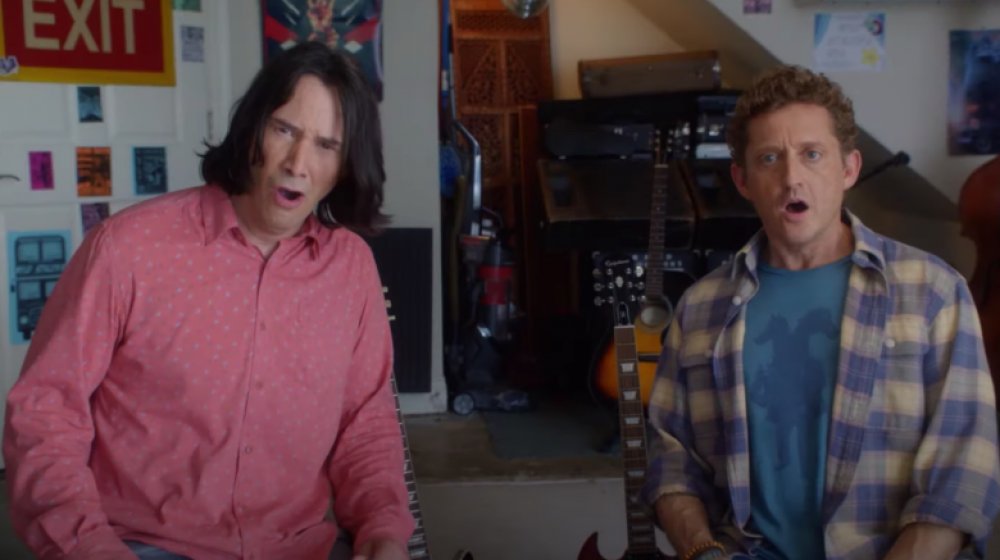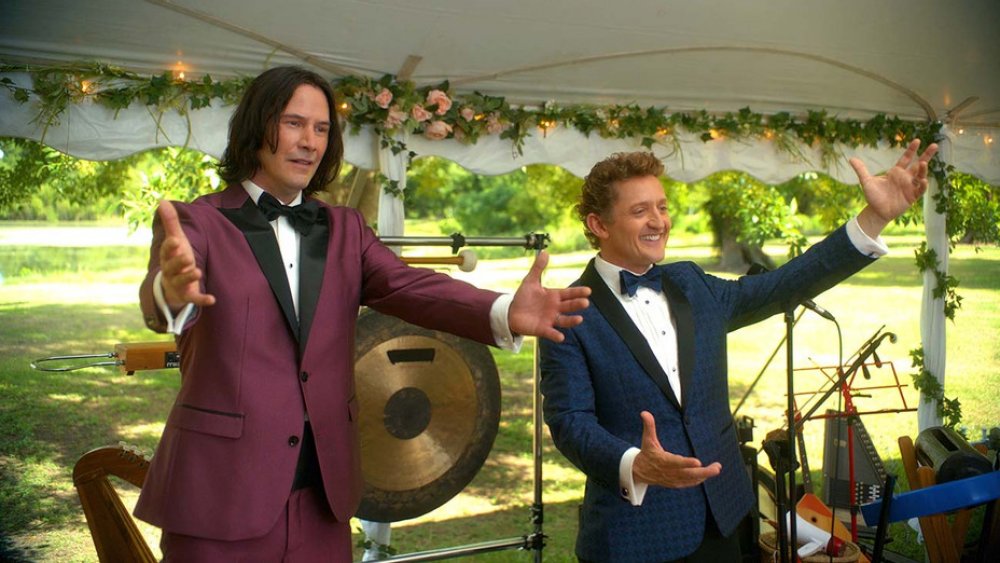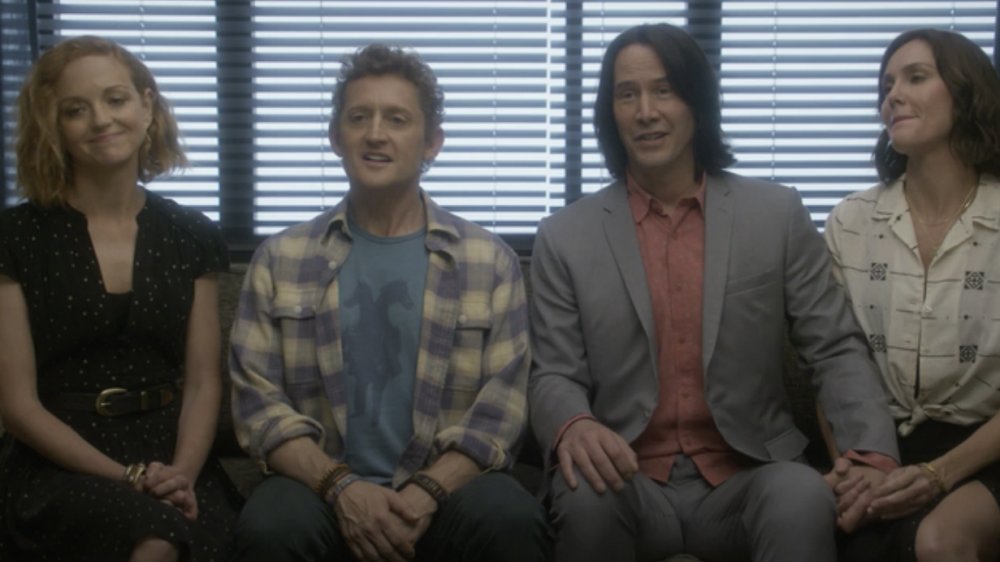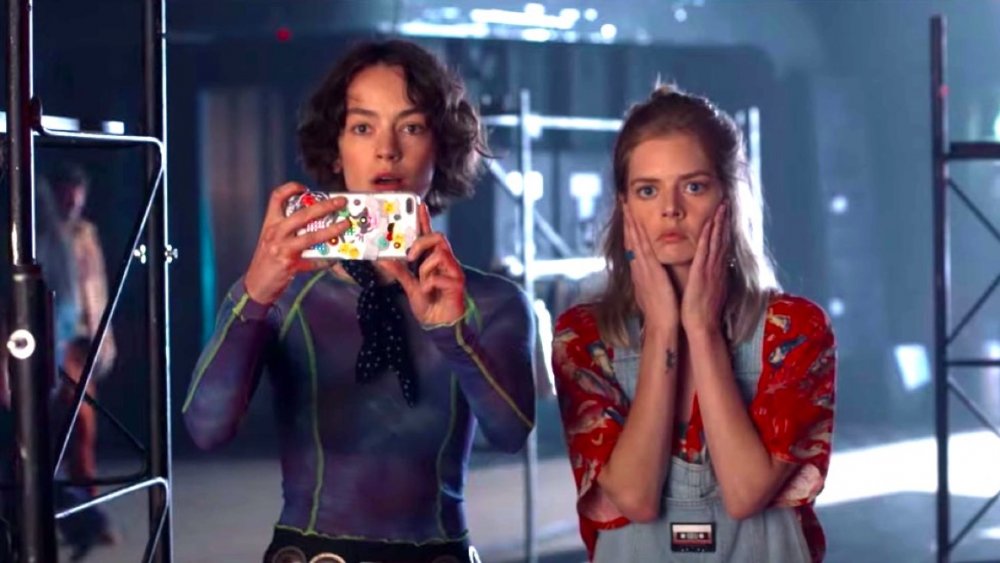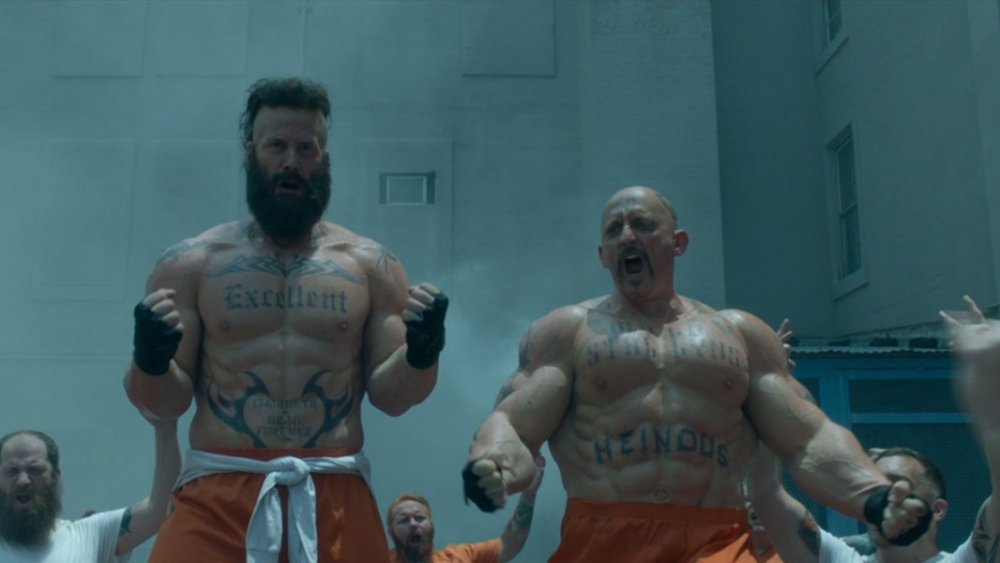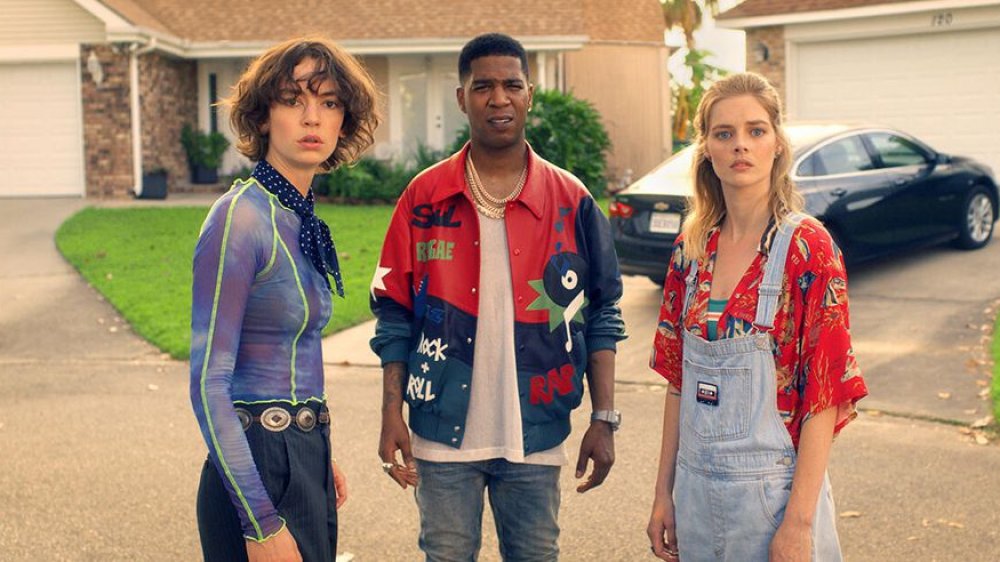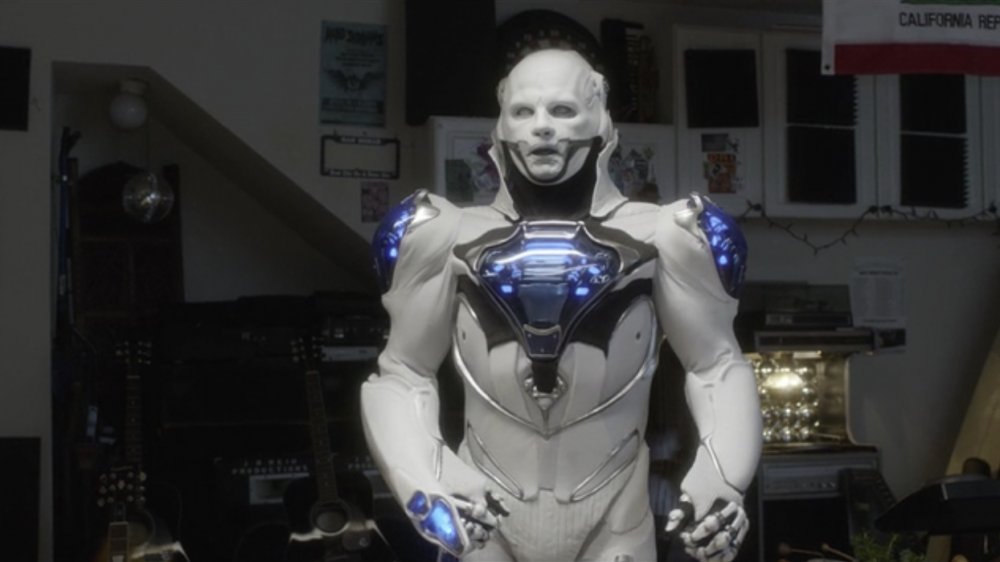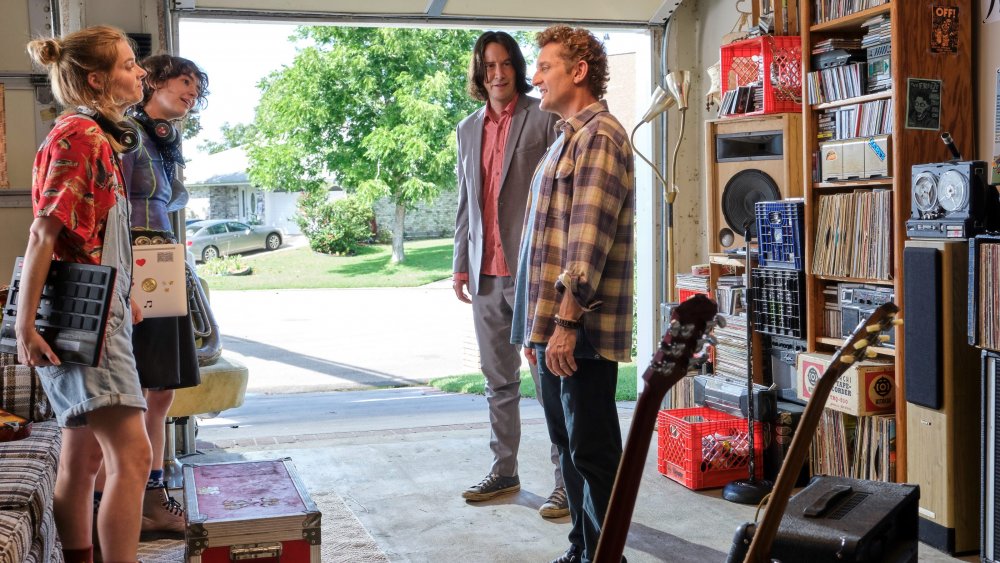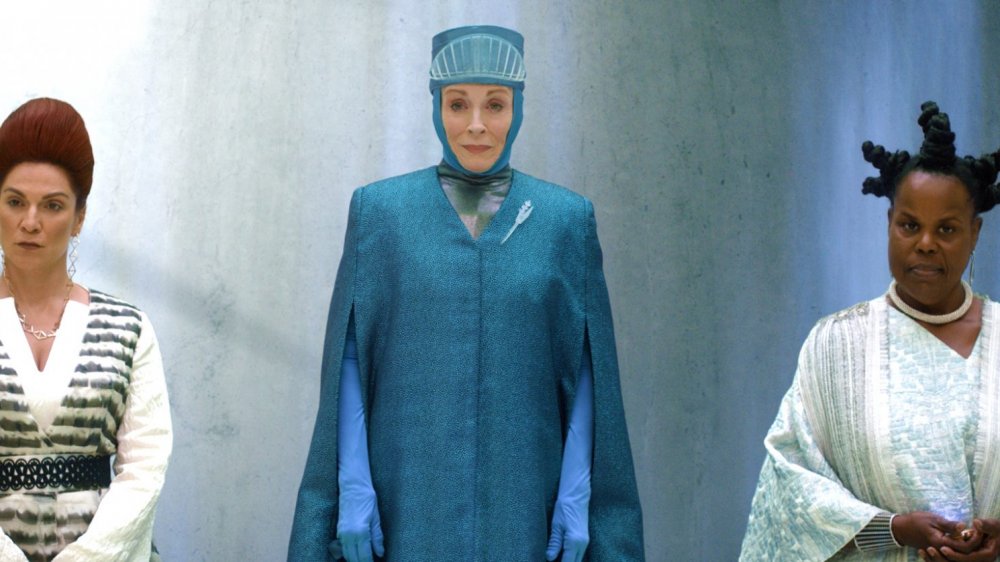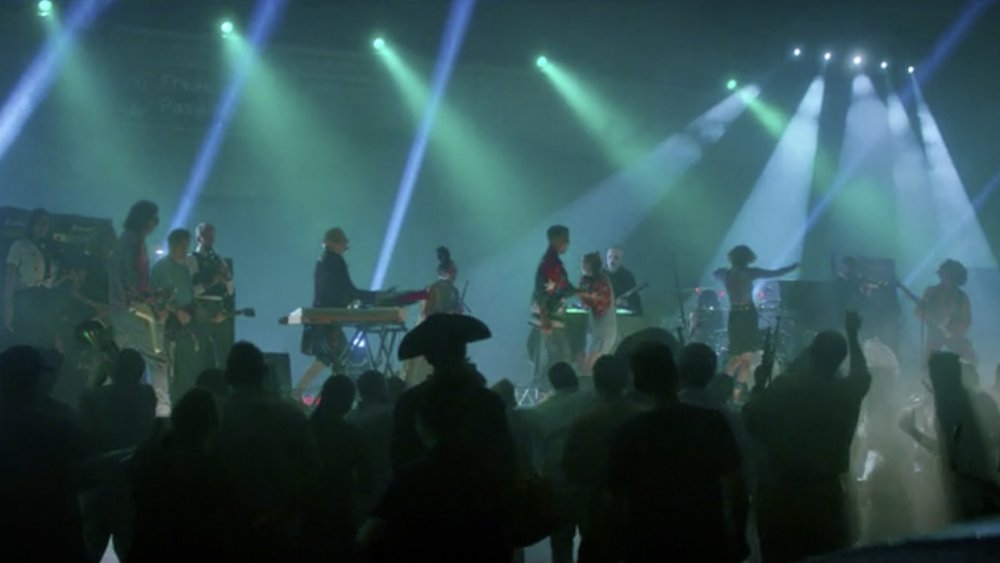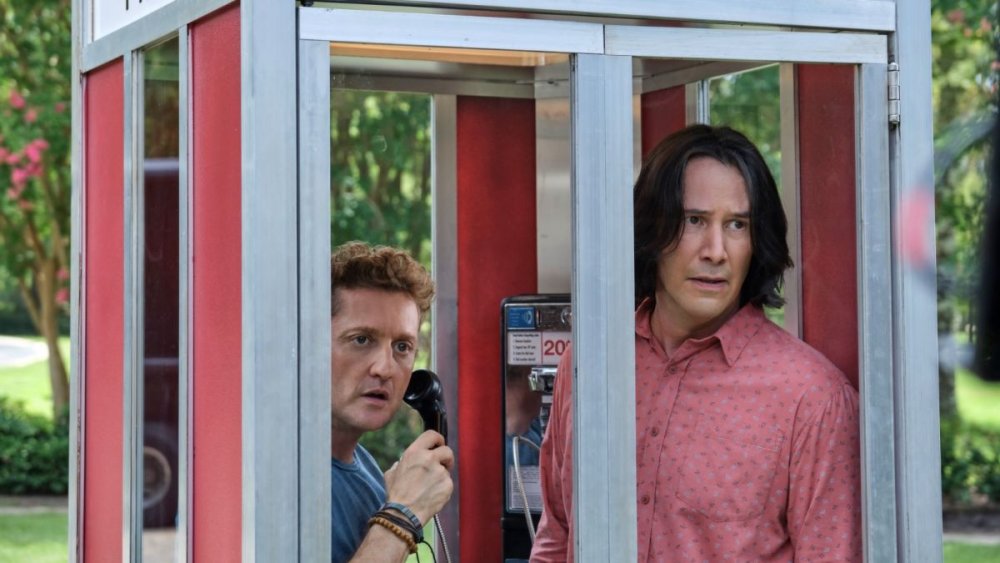5 Best And 5 Worst Things In Bill & Ted Face The Music
It's been more than three decades since Bill S. Preston (Alex Winter) and Ted "Theodore" Logan (Keanu Reeves) first zipped back and forth through time in a futuristic phone booth in order to ace their history project and save the world in Bill & Ted's Excellent Adventure. Since then, they've died, befriended Death, come back to life, gotten married, had children, and started a most triumphant band. But even after two movies spanning multiple centuries and a trip to the afterlife, Bill and Ted still hadn't fulfilled their ultimate destiny — to write the song that would unite humanity and bring about world peace.
And that brings us to 2020's Bill & Ted Face the Music, which finds the titular duo as middle-aged dads who worry that they'll never achieve the goal that was set out for them as teenagers. Now, the pressure to finally write their world-changing song is higher than ever, with the fate of the entire universe hanging in the balance. The long-anticipated threequel had a rocky road to release, bouncing around in time almost as much as Bill and Ted themselves as its theatrical release date was moved back and forth due to the craziness of 2020 before the decision was finally made to release it directly to on-demand streaming services. But now that the film has made its debut, is it truly excellent or bogus? Turns out, it's a little of both. Here are the five best and five worst things in Bill & Ted Face the Music.
Be warned, there are major spoilers ahead.
Best - Bill & Ted Face the Music has an awesome wedding song
Bill & Ted Face the Music opens with an awkward but weirdly appropriate wedding, as Missy (Amy Stoch) — who was a senior when Bill and Ted were freshman and was married to Bill's dad in the first movie and Ted's dad in the second — is now marrying Ted's little brother, Deacon (Beck Bennett). After delivering a characteristically strange yet heartfelt wedding speech, Bill and Ted honor the happy couple by providing the music for their first dance. It's the world premiere of the first three movements of "That Which Binds Us Through Time: The Chemical, Physical, and Biological Nature of Love; an Exploration of the Meaning of Meaning, Part 1."
What follows is a bizarrely hilarious mishmash of throat singing, bagpipes, trumpet, various percussion instruments from around the world, and who knows what else. As Missy and Deacon try in vain to dance to the unique music their stepsons/brothers/uncles are producing, it's abundantly clear just how desperate Bill and Ted have become to try to write the song that Rufus (George Carlin) told them they were destined to write in the first movie. Between the song and their speech, it's a perfect reintroduction to Bill and Ted, showing that they're still the same lovable doofuses from the first two movies while also acknowledging how the intervening 25 years have weighed on them.
Worst - Problems with the future princesses
While we're glad that Bill and Ted's wives, Princess Joanna (Jayma Mays) and Princess Elizabeth (Erinn Hayes), get a little more to do in Face the Music than in the previous two films (even if their recasting is a little potentially problematic), their subplot winds up being one of the film's weaker links. Early on, their much older selves arrive in a time machine of their own to pull their younger counterparts out of marriage counseling to travel through time and prove they'd be better off without Bill and Ted. But ultimately, the princesses realize they're happiest in the present with their husbands, which begs the question of why the elderly princesses felt the need to intervene in their lives in the first place.
One could argue that the future princesses actually traveled back in time to save their marriages — using a bit of reverse psychology — but that also doesn't make sense when we learn the real reason why Joanna and Elizabeth have requested marriage counseling. It's not, as is first implied, because they're frustrated by their husbands co-dependence. It's actually because they're worried about their emotional well-being after 25 years of trying to write a world-saving song and coming up empty. So, by all accounts, their marriages weren't even in trouble to begin with, and the idea of leaving their husbands only ever occurred to them when their future selves showed up. What was the point of it all? We may never know.
Best - Billie S. Logan and Thea 'Theodora' Preston are amazing
At the end of Bill & Ted's Bogus Journey, we were introduced to babies "Little Bill" and "Little Ted" as the Wyld Stallyns played their first, most triumphant concert. In Face the Music, we learn that those babies are actually Bill and Ted's daughters, Thea "Theodora" Preston (Samara Weaving) and Billie S. Logan (Brigette Lundy-Paine), and that they've grown up to be their dads' biggest fans. While Billie and Thea aren't in a band themselves, they're both music aficionados, and they love to remix their favorite music into new creations of their own.
After seeing their dads disappear into the future, Billie and Thea embark on an excellent adventure of their own, trying to assemble the greatest band the world has ever seen to help their dads perform their song. Recruiting all-time greats such as Jimi Hendrix (DazMann Still), Louis Armstrong (Jeremiah Craft), and Wolfgang Amadeus Mozart (Daniel Dorr), Billie and Thea use their encyclopedic musical knowledge to build the most eclectic band the world has ever seen.
But even more than assembling an all-star team of musicians, Billie and Thea's greatest contribution to Bill & Ted Face the Music are Lundy-Paine and Weaving themselves, who recall the same exuberant, caffeinated energy that Reeves and Winter brought to the original film. Yet Billie and Thea aren't carbon copies of their dads, either, as evidenced by their more thoughtful approach to problem-solving and surprisingly advanced understanding of temporal dynamics. They're a delightful addition to the world of Bill & Ted, and we wouldn't say no to an eventual Billie & Thea's Excellent Adventure at a point further down the timeline.
Worst - The future Bill and Teds aren't so great
In the 25 years that have passed for the characters between Excellent Adventure and Face the Music, Bill and Ted have managed to remain the same big-hearted, well-intentioned, music-loving bozos that we first met as teenagers. Yet in Bill & Ted Face the Music, when Bill and Ted decide to head to the future to see if they can get their world-uniting song from their future selves, the version of themselves that they meet (save the nonagenarian versions of themselves from 2067) are all total jerks.
They start out by traveling to 2022, where they meet themselves as bitter, washed-up has-beens who've been left by their wives and are living in a van. Their next stop is 2025, where they find themselves squatting at Dave Grohl's mansion in an attempt to pass one of the Foo Fighters frontman's songs off as their own. The 2025 Bill and Ted even wind up attempting to kill their past selves, even though that would lead to their own destruction. Then they head to 2030, where they're in prison (for breaking into Dave Grohl's house, of course), and they're determined to swap places with their 2020 counterparts. Not only does it not make sense that none of these Bills or Teds would have any memory of their universe-aligning concert in 2020 — especially since the 2067 versions of themselves do remember it — but their characterization is light years from the previously consistent twosome we've come to know and love.
Best - Kid Cudi, time-travel expert
While most of the other members of Bill and Ted's band that perform at the end of the film were carefully curated by their daughters, Kid Cudi (playing himself) is a gift from the universe itself. At the beginning of Bill & Ted Face the Music, we learn that the very fabric of space and time is unraveling. (Why? We never find out, but it doesn't really matter.) People are disappearing out of their own times and being dropped into totally different times and places. That's how Kid Cudi winds up getting dropped onto Bill and Ted's cul-de-sac in San Dimas, right as Thea and Billie have returned home with their newly assembled band.
But while Kid Cudi does add another fun layer to the genre salad of the band, he brings a lot more than his rapping and music production skills to the table. It turns out that this version of Kid Cudi is obsessed with quantum physics, and as soon as Billie and Thea explain to him what's happening with the universe, he jumps into problem-solving mode with both feet. For the rest of the film, Kid Cudi serves as the group's resident time-travel expert, whom they consult whenever they have a particularly tricky quantum conundrum. It's enjoyable precisely because it's so unexpected, and it's fun to have a member of the group who talks about time travel in a more academic way than we're used to from Bill & Ted films, even if the other characters rarely understand him.
Worst - Dennis the assassin robot doesn't really work
One of the weirder additions to the Bill & Ted mythos was the time-traveling assassin robots that traveled from the future to kill Bill and Ted in Bill & Ted's Bogus Journey, a theme which Face the Music decided to revisit for some reason. This time, the assassin is a robot constructed by the Great Leader (Holland Taylor), who turns out to be Rufus' widow, and she has a very different view of history than her late husband. Inexplicably modeled after the Great Leader's daughter's ex-boyfriend and even given his name, Dennis Caleb McCoy (Anthony Carrigan), the robot skips around the timeline, determined to exterminate his targets.
Yet his Terminator-like mission takes a turn when the robot realizes that Bill and Ted actually have acquired the song that will unite the world, canceling his mission ... but then they want him to kill them anyway so they can save their daughters, whom he accidentally killed earlier. The moral quandary seems to short-circuit Dennis, and he winds up killing all three of them, sending them all to Hell to negotiate with Death. From then on, Dennis is just a strange tag-along who acts more like a lost child than a killer robot. Overall, his inclusion seems intended to add laughs, but instead, it winds up dragging the film down, with Dennis failing to live up to the high energy and zany comedy of the other characters. Even his dancing at the end feels a little dull and disconnected, which is unfortunate when everything else about the final concert comes together so well.
Best - Wyld Stallyns hand over the reins in Face the Music
After spending most of three movies under the impression that the fate of the world is entirely on their own shoulders, Bill and Ted realize in the climax of Face the Music that it's their daughters, not them, who have the potential to save the world. Relying on Billie and Thea's keen musical senses, Bill and Ted follow their lead and take up their guitars as members of the band, not leaders. It still fits (more or less, much like most of the logic in the Bill & Ted films) with what Rufus told them in the first movie when he explained, "If you guys were separated, it would have been disastrous for life as we know it. You see, eventually your music will help put an end to war and poverty. It will align the planets and bring them into universal harmony."
Technically, that's all still true. Bill and Ted needed to stay together so that Billie and Thea could grow up side by side, listening to music and hearing their dads' stories of traveling through time. And although we didn't see the concert at the end of the film end war and poverty, we did witness the planets realigning when the universe returned to its rightful state. Does it make complete sense with what we've previously been told? Well, no, but that's par for the course for a Bill & Ted movie. Besides, the reason it works isn't because it's an intricately conceived plot twist but because it shows the growth of Bill and Ted's characters. They begin the franchise desiring greatness for themselves, but they end it by showing that they're willing to step away from the spotlight without a second thought, handing it over to their kids for the greater good.
Worst - The Great Leader's plan
Sure, the Great Leader having a different interpretation of the events of history than her late husband, as well as her own approach to safeguarding the timeline, adds a few interesting wrinkles to the plot of Bill & Ted Face the Music, but when you really think about it, her plan doesn't make any sense. She tells her daughter, Kelly (Kristen Schaal), that she, along with others on the Council, believe that it's the deaths of Bill and Ted that will usher in the events that lead to their utopian future and repair the universe and not their song performance.
But that doesn't jibe at all with either what we were told in the first film — that the future society is built on Wyld Stallyns music — or even with the worldbuilding of the third film. The Great Leader knows the precise date and time of the concert which will repair the universe and lead to their society, yet she somehow reasons that preventing the concert by killing Bill and Ted is the better option. There's no evidence that seems to support her belief, and by trying to prevent events that already happened earlier in her own timeline, she seems to be risking catastrophe. Maybe if the future was a disaster, it would make sense that she would try to prevent it, but as it stands, it doesn't track at all that she'd try to stop the events that create her own utopia, especially in the name of preserving it.
Best - It's not about the song at all
The truth is, Bill & Ted's Excellent Adventure set up an impossible premise for Face the Music to deliver on. It may work in the first film to establish that in the future, Bill and Ted will write a song that brings about universal peace and harmony, but it's another thing entirely to have to show that song in the third film. Music is subjective, and one person's genius may be another's nails on a chalkboard, which means that there's no song anyone could write that all audiences would buy as the song that would save the world. Yet the entire plot of Face the Music relies on Bill and Ted performing such a song by the end of the film.
The solution to this seemingly unsolvable problem turned out to be surprisingly simple and elegant. It's not about the song itself, but instead, it's about the act of humanity uniting across time and space to create music together. We could spend energy asking where Bill and Ted get their infinite supply of instruments that they distribute throughout the timeline or mulling over any of the other numerous questions raised by the finale, but that would be missing the point of Face the Music (and really, the entire Bill & Ted trilogy), which is all about friends and strangers working together to accomplish great things. So even if the song itself isn't entirely your jam, there's no need to suspend disbelief because as Thea and Billie explain at the end of the film, "It wasn't so much the song that made the difference; it was everyone playing it together."
Worst - There's some inconsistent time-travel logic in Bill & Ted Face the Music
Time travel may be theoretical (as far as we know), but we still expect time-travel stories to consistently follow their own internal logic. Of course, Bill & Ted movies have always kind of marched to the beat of their own drum in the logic department, but the reasoning of Face the Music seems a little nonsensical even by Bill & Ted standards. First, there's the question of how none of the future Bills and Teds seem to have any knowledge of the 2020 concert until the geriatric Bill and Ted from 2067, yet they all remember going on the same time-traveling journey that we see play out in the film, as evidenced by the 2025 Bill and Ted being able to hatch an elaborate plan to try to deceive their past selves (which they should've remembered wouldn't work, but that's beside the point).
But there's also the issue of why Rufus seemed to know exactly how and when Bill and Ted would save the world, but no one else in the future did. The Great Leader seemed to have no knowledge of how the concert came about, who performed it, or what the song sounded like. All she had was Rufus' information, even though she had technology that put all of time and space right at her fingertips. Plus, how do any of these futures even exist if all of reality collapsed in on itself in 2020? All of it adds up to a time-travel plot that mirrors the wackiness of the first film but lacks the internal cohesion. If Face the Music wanted to play around with a bunch of alternate realities, that could've been cool, but that concept doesn't really work within the confines of a plot focused on maintaining the reality that already exists.
